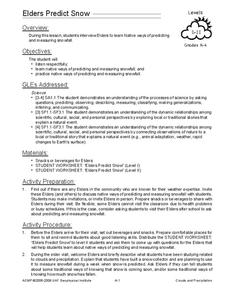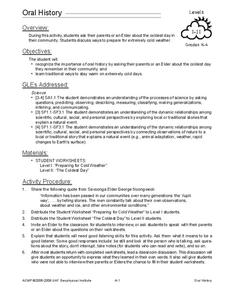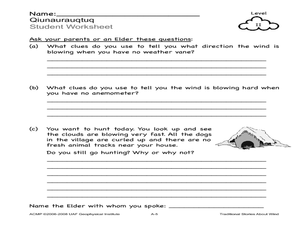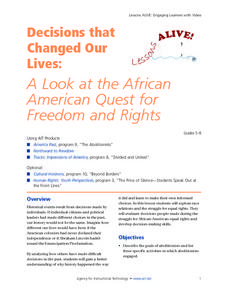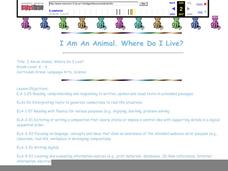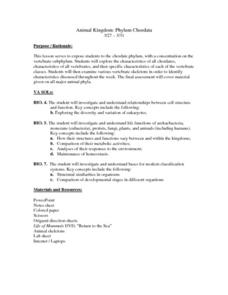Curated OER
Elders Predict Snow
Students interview Native Indians to learn their ways for predicting and measuring snowfall. In this weather measurement lesson, students invite a Native Elder to their classroom to tell them about how they predicted weather. Students...
Curated OER
Food for Thought
Learners understand the importance of each member of a food chain through a game. In this food chains lesson, students receive background information and then play a game to simulate what happens in the food chain of an endangered...
Curated OER
Oral History
Students interview a Native Elder to learn about oral history and cold weather. In this weather lesson, students ask an Elder about the coldest day they remember in their community and complete two worksheets for the topic.
Curated OER
Traditional Stories about Wind
Young scholars observe and talk about wind using no weather instruments. In this wind lesson plan, students use their senses to observe wind. They also interview an Elder about wind.
Curated OER
George Orwell's Essay on his Life in Burma: "Shooting an Elephant"
Students read George Orwell's essay "Shooting an Elephant" as an analysis for the historical context. In this historical analysis lesson plan, students analyze the main points in the essay to identify its cultural and historical context....
Curated OER
What Do You Know About Horseshoe Crabs?
High schoolers create a learning tool based on information given on the assigned website. In this ocean life lesson, students read about the horseshoe crab and develop a worksheet, scavenger hunt, board game or any tool to aid learning....
Curated OER
Where Are The Dinosaurs?
Students study the existence of dinosaurs as a precursor to learning about extinction. In this dinosaurs instructional activity, students watch dinosaur video at assigned web sites. They discuss what they observed in the videos including...
Curated OER
Gotta Be Me
Students create model societies. In this social identity lesson, students conduct research so that they can plan and present model societies to their classmates. The societies must include information regarding how their society will...
Curated OER
Title: Biodiversity Analysis and Comparison Within the New Jersey Highlands
Students explore the concept of biodiversity. In this environmental science lesson, students use field methods to examine the trophic relationship that allows for species diversity.
Curated OER
Decisions That Changed Our Lives: A Look At the African American Quest for Freedom and Rights
Students are introduced to the goals of abolitionists throughout history. In groups, they use the internet to discover the purpose of the Underground Railroad and why there were bus boycotts in the 1960s. They compare and contrast the...
Curated OER
Dinosaurs 1: Where Are the Dinosaurs?
Students explore dinosaurs. In this dinosaur identification lesson, students watch video clips for different dinosaurs from the Discovery Kids website. Students discuss the clips with their teacher. Students may then role play the...
Curated OER
Worming Your Way Through the Soil
Students study soil, living and non-living particles in the soil, and learn about composting. In this soil study lesson, students study soil samples and discuss the living and non-living components of the soil. Students classify the...
Curated OER
African Mask
Students research the importance of masks to the African culture. In this African mask lesson, students design original masks using a variety of materials. Students use the template provided to create their masks.
Curated OER
Biomes: Freshwater & Seawater
Middle schoolers observe organisms behavior and adaptations. In this biomes lesson students conduct fieldwork to determine water quality and answer questions about the differences between different habitats.
Curated OER
Where's the Grass
Students participate in a grassland game. In this grassland instructional activity, students simulate the impact of grazing animals and invasive weeds on grasslands.
Curated OER
I Am An Animal: Where Do I Live?
Students make an alphabet booklet using the computer to find pictures and facts about farm animals, zoo animals and pets. They write facts about the animals: where they live, what they eat, their coloring, etc.
Curated OER
The Magic of Algebra: Original Lesson Plan
Students participate in a teacher led math "trick." The teacher "reads the mind of the students. The answer to the problem is always 4, and by following the directions, the teacher can guess that students are thinking of Denmark, and...
Curated OER
War and the Animal
Students analyze the spatial organization of people, places, and environments in a spatial context. They gain personal insight into the horrors of war and the importance of ethnicity. Students define all key terms, analyze a world map...
Outdoor Learning Center
Outdoor Survival
Which of the following can you survive without for the longest time: water, food, or a positive mental attitude? The answer may surprise you. Guide learners of all ages through games, activities, and discussions about surviving in the...
Curated OER
Dirt Life
Students select and collect soil samples from a variety of locations (schoolyard, home, etc.). They do this lab after an interest-generating discussion about "dirt" and microbes. Students make a dilution in sterile water, plate it on a...
Curated OER
Bats
Students hypothesize and model how the bones in a bat wing are made up. In this exploratory activity students test their hypothesis, develop questions about bat parts and watch a video on bats.
Curated OER
Data Habitats
Students develop data acquisition skills and quantify descriptive data. In this data lesson students divide into groups and do an activity that shows them why it is important to record data with accuracy and consistency.
Alabama Learning Exchange
Animals as Pets: Everything You Need to Know
Students complete internet based research on pet care in order to prepare a written and oral presentation for the class. They examine the life span, environment, food and grooming of the pet they chose to research. They complete the...
Curated OER
Animal Kingdom: Phylum Chordata
Learners use a dichotomous key to classify various vertebrate jar speciments into classes. They examine the speciments for general characteristics of each class and fill in a corresponding chart and then complete a few final assessment...


